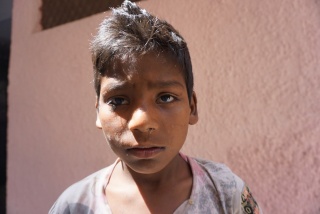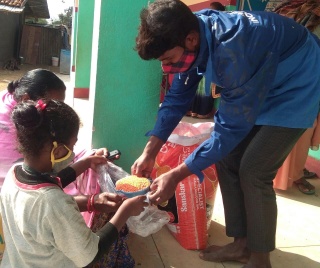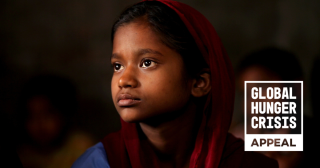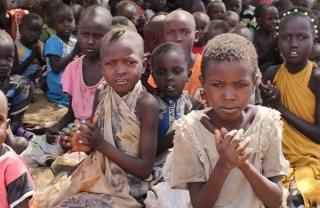
Living in Hope
We hear from Father Joson, from our partner BREAD. He runs our programme in India, where Mary’s Meals is currently feeding 64,000 children every school day.
Eight-year-old Amar has been partially blind since birth. He lives with his parents and five siblings in a slum in the southern part of Delhi. His dad is a part-time handy man for an electrical company. The family barely manages one square meal a day.
Delhi, our capital city, is teeming with people. More than 13 million live here, and the population is still growing - mostly due to migration from villages. When lockdown was imposed during the first wave of the pandemic, families like Amar Khan’s were forced to migrate back to their native states. Many had to walk hundreds of miles, even as far as Bihar; one of the least developed states in India.

As the pandemic has subsided in recent months there has been a reverse migration, back to the city, this time with greater force and desperation. Amar Khan’s family was among those making that long journey. His mother says: “When we went back to our village, there was nothing to eat; it was a worse situation than in the Delhi slums.”
Her son adds: “I was longing for the dry rations we had received from Mary’s Meals. But even that was not available in our far-off village in Bihar.”
However, from March 2022 onwards, the people who live in the slums were in for a much bigger shock with the sky-rocketing prices of essential commodities due to the Russian invasion of Ukraine. These innocent ones, who have never even heard of Ukraine, are bearing the ripple effects of the war that is happening so far away from the slum where they live.
The Impact of the Russian Invasion of Ukraine
Many people, and not just in India, initially thought that the conflict in Ukraine was ‘far away’ and wouldn’t affect them. However, it quickly became clear that the impact of this war would be felt far beyond Ukrainian borders.
Russia’s invasion of Ukraine affects everyone – both of these countries are among the world’s biggest producers and exporters of staple food items such as wheat and corn – and the impact is already being felt in Mary’s Meals’ school feeding programme in India and by the children we serve.
Along with food prices, the cost of other essentials such as mineral fertilisers, natural gas and oil is skyrocketing. Again, Russia and Ukraine carry an important influence on the global economy, due to their role as major suppliers in a number of these commodity markets.
The Soaring Cost of Living in India
Household incomes just aren’t stretching as far they used to, and people have very little spare cash to spend on other essential items like health and education. With their purchasing capacity severely restricted, families are unable to buy the same amount of food and can only afford basic necessities like cereals, pulses and oil. My fear is that this will result in chronic under-nourishment in about half of the population in India, particularly among vulnerable groups of children, women and the elderly from lower income households.
Shipping companies are charging higher insurance premiums for freight consignments from the Black Sea. This has a direct impact on essentials such as cooking oils. Prices for essentials such as sunflower and mustard oil (used in the preparation of the vegetable curries that Mary’s Meals serves in schools) are rising steadily, which could impact the feeding programme. Other varieties of cooking oil such as rapeseed are now simply unavailable due to blocks on its importation.
The next major threat to our food prices and security comes from chemical fertiliser shortages. Russia is the second largest producer of potash, which is used in the production of Di-ammonium phosphate (DAP). DAP is critical for chemical and industrial agriculture, and, without it, farmers will face great challenges with their crops. I have personally seen the DAP prices jump in a matter of days.
Many of the children who receive Mary’s Meals come from farming families. Away from modern technology and, due to things like lack of money and equipment, most of them still practice old forms of agriculture. The rise in the price of fertilisers makes their situation even more challenging as they are purchasing less fertiliser for their crops. Providing less fertiliser to the crops affects the quality and volume of the harvest. Even when they are able to buy sufficient fertiliser, they are paying higher prices which again impacts their financial status.
At times, in spite of the fact that children are longing to study, they are asked to help their parents in their field, or work elsewhere, to make ends meet. This is affecting the education of children who would otherwise be in school, receiving Mary’s Meals and learning.
The most expensive ‘elephant in the room’ is the price of crude oil. From tractors to water pumps - agriculture requires a lot of fuel. Paying larger proportions of their income on these goods, means less is left for families to afford other important requirements, like education and health.
While children are growing, they need sufficient nutritious food on their plates for their complete physical and mental development. Children are provided Mary’s Meals at school, but at home they are getting a smaller portion as well as food which is less nutritious. This is leading to under-nourishment which could affect the all-round development of the children and their performance in school.
If the DAP sanctions and blockades continue, it’s hard to predict when the prices will stabilise. The direct result is rising costs and farmers therefore getting less DAP for their fields. With less DAP for their crops, this will influence the quality and quantity of the farmers’ yields. While both farmers and consumers should be prepared to weather the storm, children will continue to be hit by the impact the war in Ukraine has on agriculture.
The Importance of Mary's Meals
All of this means that ensuring the continuation of the Mary’s Meals programme in India is more crucial than ever. BREAD believes in empowerment through education. Our partnership with Mary’s Meals means there is an incentive for hungry children to come to the classroom. This gives children the sustenance they require to survive, concentrate, learn and grow, and to develop healthily.

Magal is one of these children. He is 15 years old and in Grade 9 at St. Joseph’s School in Jharkhand. He told me that he had overheard their teacher talking to a member of Mary’s Meals staff about the Russian war in Ukraine. His friend Suresh had asked him: “How can a war taking place in a far distant area unknown and unseen by us affect us so badly?” Magal replied: “They said that although this war does not affect us directly, its consequences affect the whole world, including India and including Mary’s Meals.”
Magal had heard the adults talking about the rising prices and the influence Russia and Ukraine have because they are major suppliers of things like food items and oil. “Now everything will be very costly” Magal told his friend. “Oh really? That’s so sad!” was all Suresh could reply.
What is truly sad is that, in the event of a catastrophe, it is the poor who often suffer the most - be it coronavirus or the invasion of Ukraine. The poorest people in the far-flung regions of India have to pay a heavy price in terms of increased hunger and debilitating poverty. Thankfully, there is a silver lining with Mary’s Meals. At least the children are able to receive some food - if not to fill their stomachs completely, then at least to stave their hunger.
As little Amar’s father sums it up: “We are facing many terrible challenges but at least my child can have a hot cooked meal each day, thanks to his school which provides Mary’s Meals”

